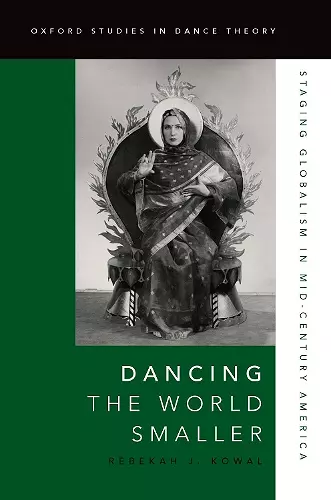Dancing the World Smaller
Staging Globalism in Mid-Century America
Format:Paperback
Publisher:Oxford University Press Inc
Published:9th Jan '20
Currently unavailable, and unfortunately no date known when it will be back
This paperback is available in another edition too:
- Hardback£96.00(9780190265311)

This insightful exploration of dance in 1940s New York reveals how artists navigated globalism and cultural diversity, showcasing the significant role of performances during a transformative era.
In Dancing the World Smaller, the author delves into the vibrant world of international dance performances in New York City during the 1940s. This period was marked by a rich tapestry of cultural exchange, where dance artists and audiences engaged in meaningful discussions about globalism in mid-twentieth-century America. The book highlights how these performances served as a battleground for broader cultural debates, exploring the complexities of diversity and the importance of honoring differences within the artistic community.
Set against the backdrop of the Second World War and the subsequent Cold War, Dancing the World Smaller reveals how modern dance and ballet flourished in New York City, a hub of cosmopolitan creativity. American choreographers and dance companies were often sent abroad as cultural ambassadors, showcasing American values and extending the nation’s geopolitical influence. However, the book also sheds light on the lesser-known support for international dance performances, which were often labeled as 'ethnic' or 'ethnologic' dance, and how these events were embraced by audiences across the nation.
Through extensive archival research and critical analysis of race and ethnicity in the U.S., Dancing the World Smaller uncovers a hidden narrative of globalism within American dance. The author brings to the forefront notable artists such as La Meri, Ruth St. Denis, and Pearl Primus, illustrating how these figures navigated the cultural landscape. The book ultimately reflects on the struggles of a nation grappling with its identity as a global superpower, balancing the ideals of globalism against the pull of isolationism.
I recommend the book with no reservations to researchers and dance practitioners, undergraduate and graduate students, and to anyone who believes that dance, as the book beautifully demonstrates, connects people. Showing that dance can 'make the world smaller,' Kowal's work brings us closer to the hope that our bodies and minds can overcome the complex challenges of our time and make the world better. * Camelia Lenart, Dance Research Journal *
Understanding the postwar period through the actions of US globalism is crucial to identifying and dismantling white supremacist institutions established to support the country's power, especially as we witness the gears of history churning out new world orders. Kowal's significant book is instructive for readers in dance, theatre, and performance studies, as well as for students of national-ism, imperialism, and American history, who seek to ascertain how the past constructed our present and how to use cultural mechanisms to improve our collective futures. * Hannah Kosstrin, Theatre Journal *
Throughout this work, Kowal's nuanced analysis uncovers the paradoxes of ethnic dance, which catalyzed new forms of cultural inclusion even as it enacted ideas of white supremacy. * The Year's Work in Critical and Cultural Theory *
The circumstances of La Meri and other artists and festival events discussed throughout are a rich resource for students and teachers willing to ask: Who and what is missing in this story? Such questions make Dancing the World Smaller a model for how to bring research to life, while also judiciously reminding us that history can offer poignant perspectives for what is happening in the cultural world of today. * Sherrie Barr, Journal of Dance Education *
Dancing the World Smaller offers a fascinating, richly layered account of the literal and figurative choreography by which a transnational assembly of dancers, critics, and impresarios helped mid-century New York lay claim to the status of a global city and helped the U.S. model itself as home to a new globalist imaginary ... Rebekah Kowal masterfully tracks the cultural factions and frictions that energized this lost chapter of dance history, and the result is a remarkable story that speaks just as meaningfully to our own fraught moment in global social and cultural politics. * Jean-Christophe Agnew, Professor of American Studies and History, Yale University *
In Dancing the World Smaller, Kowal documents a phenomenon that has largely escaped scholarly notice: the widespread interest in stagings of 'global' dance forms in New York City in the middle of the twentieth century. Based on extensive archival research, the book not only makes a compelling case for considering 'ethnic dance' alongside the dominant form of modern dance, but also shows how performances of cultural 'otherness' registered the tensions and ambivalence of US foreign policy. In the process, Kowal deftly historicizes and theorizes one of our most fundamental assumptions about dance -- its ability to bridge difference. * Anthea Kraut, Professor, Department of Dance, University of California, Riverside *
With Dancing the World Smaller, Kowal makes a significant contribution to the fields of dance history, political cultural studies, and dance research, in general. * Sherrie Barr, Journal Of Dance Education *
- Winner of Finalist, 2021 ATHE Outstanding Book Award.
ISBN: 9780190265328
Dimensions: 231mm x 155mm x 18mm
Weight: 431g
296 pages